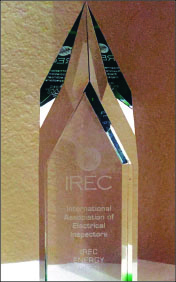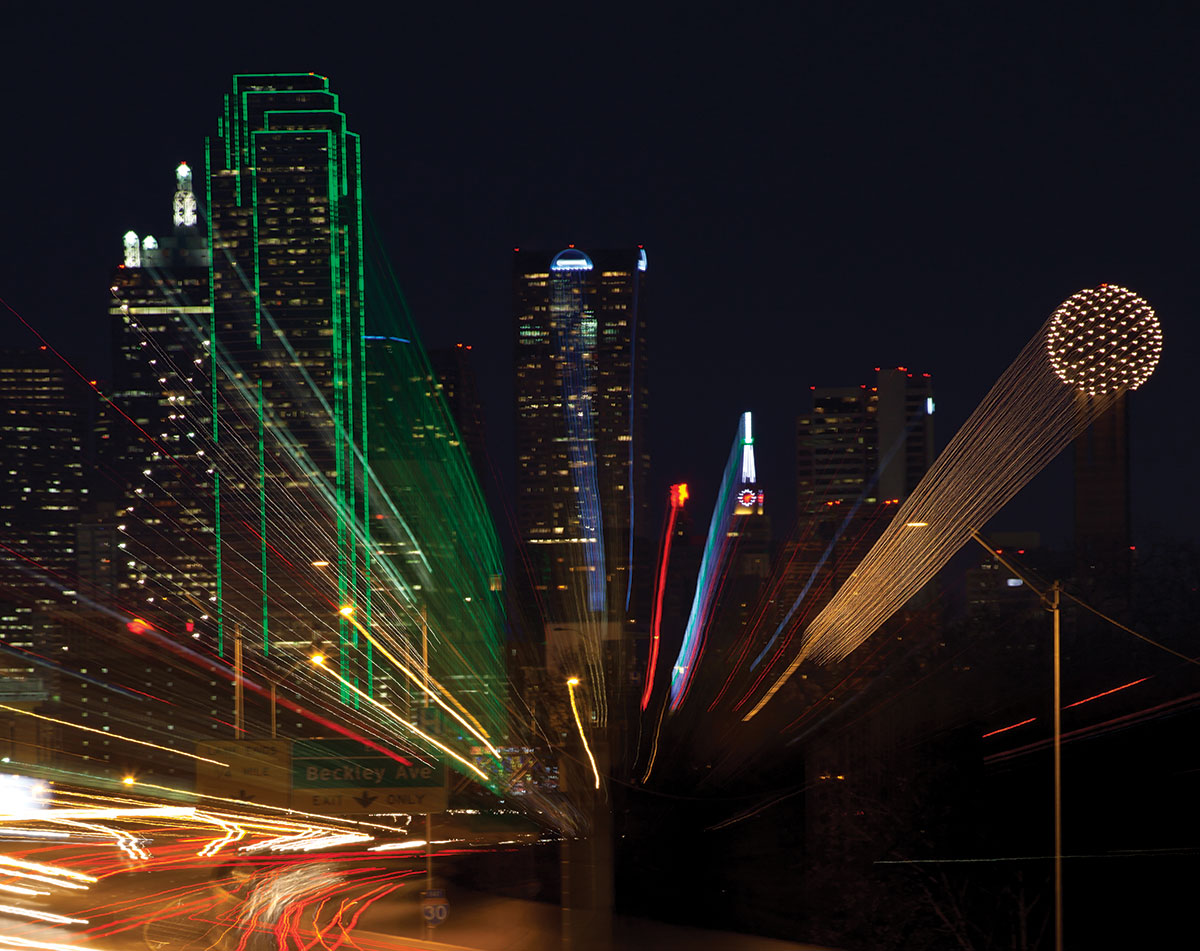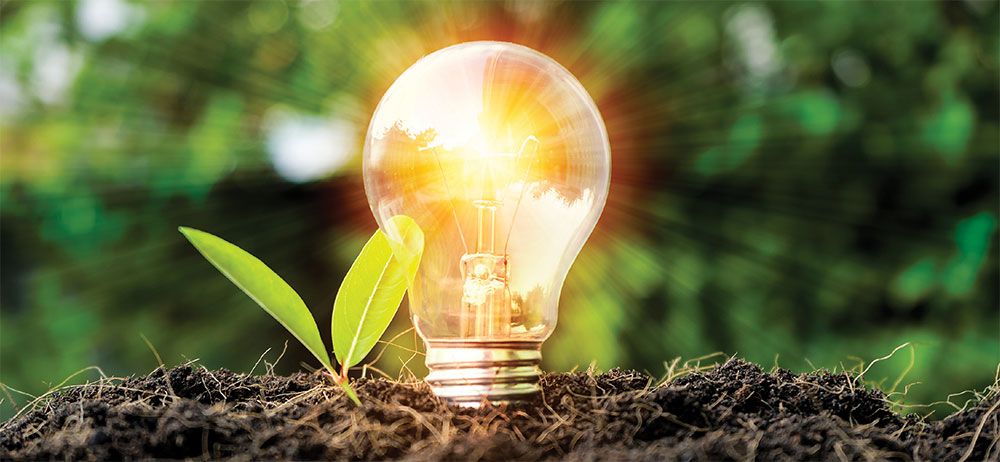In July, we were honored to be named by Interstate Renewable Energy Council (IREC) as one of their Energy Heroes and received the 2018 3iAward for our participation in the Solar Training and Education for Professionals (STEP) program. We were thrilled to share the stage with other honorees including New York State Energy Research & Development Authority (NYSERDA) Solar Market Accelerator, Environmental Law & Policy Center of Chicago, International Code Council’s Solar Rating and Certification Corporation (ICC-SRCC) and International Association of Fire Fighters & National Association of State Fire Marshals.
“Municipal code officials often wear multiple hats and now more than ever must be up-to-date on the latest solar technologies and codes. Acknowledging these challenges, the International Association of Electrical Inspectors (IAEI) and the International Code Council’s Solar Rating and Certification Corporation (ICC-SRCC) have worked with IREC to bring the best new training to their professionals,” Solar Novus reported in July. “In just 18 months, more than 5,000 building and electrical inspectors and planners participated in unique, online and live solar trainings thanks to the commitment and work of these two organizations.”
Our Technical Advisor of Education, Codes and Standards Joseph Wages, Jr., was key in managing the program for IAEI, and received the award on the Association’s behalf. He said he felt a sense of pride that IAEI would be nominated for the award and was honored to be the person to represent the Association at the ceremony.
“All I could think about was the hundreds of hours of work our team of IAEI Subject Matter Experts (SMEs) and instructors had committed to the success of this project,” he described. “I wished they all could have been there and received this award. They are the true heroes.
“Keeping families electrically safe is a goal worth fighting for, and awards sometimes are a result,” Wages said. “The award acknowledges the role that IAEI plays in providing second-to-none electrical education to inspectors, electricians, and all other electrical professionals around the world. It is an acknowledgment of many years of hard work and dedication which involves numerous individuals.”
Our collaboration with IREC began in 2012 when The Department of Energy (DOE) offered a grant for training inspectors, installers, and plans reviewers on PV systems. When IREC received the grant, they approached us after learning of our work with SolarTech which had a similar grant through DOE. We started with assisting in the development of an online training program, and over the years have expanded into developing and delivering onsite training.
We provided the SMEs in the development of the online course material, and we had them update the material to reflect current National Electrical Code. Once we were asked to provide onsite training, our SMEs assisted in creating the training and provided the trainers. We helped promote the program by hosting a link on our website and promoting the online training through our IAEI News magazine and weekly newsletters.
Laure-Jeanne Davignon, director of workforce development explained that the main goal of the program was to decrease the soft, non-technology costs associated with solar technology by providing education to allied professionals that would increase their solar technology knowledge.
“In the case of electrical permitting staff and inspectors, the goal was to increase their effectiveness in reviewing solar permits and conducting solar inspections,” she said.
Davignon considers the program a success, and I agree with her. She cited the number of code officials trained across the United States (including IAEI members), and she has the research to support her position.
“Eighty-six percent (of participants) either ‘fully’ or ‘mostly’ agreed that they feel more prepared to work with solar electric systems as a result of having taken the course. In addition, 93 percent said they would recommend the course to a friend or colleague,” Davignon explained.
This training is so important because the demand for PV installations will only increase across the United States and around the world in the years to come. Cities and regions across the country are setting goals for 100 percent renewable energy.
“Denver Mayor Michael Hancock unveiled plans to transition Denver to 100 percent clean, renewable electricity by 2030,” reported CBS 4 Denver in July. “According to officials, Denver is the 73rd city in the United States to commit to 100 percent clean energy. Nine other Colorado communities have also adopted a 100 percent clean energy goal.” Denver’s plan includes increasing the energy efficiency in current buildings and will require new structures to have a net-zero building code by 2035.
An Atlanta city council committee, in June, began considering three proposals to make it the first Southern city to be on the path to 100 percent renewable electricity by 2035, reported Inside Climate News. “Clean sources like solar and hydropower make up 6 percent of Atlanta’s total electricity supply now, and that’s expected to reach only 7 percent in the next three to five years according to the plan,” the outlet reported. One of the pathways identified would provide electricity by using rooftop solar in the City of Atlanta and larger-scale solar farms in other parts of the state.
Even smaller communities are going solar. Georgetown, Texas, located north of Austin, cut the ribbon in June on a 1,200-acre solar farm housing 1.7 million solar panels located in West Texas, according to KVUE.com. The city had been using mostly wind power from a farm west of Amarillo in its efforts to use 100 percent renewable energy
There are just three examples of opportunities for PV installations. Inside Climate News also reported in July that other cities that have vowed to use 100 percent renewable electricity include Salt Lake City, San Diego, St. Louis, and Orlando.
The STEP program was so unique because it was created by the same people who are involved in the development of the National Electrical Code, and it provided inspectors, plans reviewers, and installers free, needed training on the Code requirements for PV installations. Having this training ensures safe installations and also helps reduce soft costs associated with PV installations.
While the grant ended in August 2018, our collaboration with IREC has many opportunities to continue.
“IAEI and the International Code Council will continue in-person courses according to member demand,” Davignon said. “IREC will continue to host a very engaging, ‘This Old House’ style of code official inspection online learning modules at www.cleanenergytraining.org. A possible future area of collaboration is energy storage, which is a rapidly-expanding sector in the energy industry focused on energy resilience.”
We look forward to our continued partnership with IREC, and our role in promoting the online training, along with marketing and providing the in-person training for those onsite sessions.
This award is your award and acknowledges the high level of professionalism and training you bring to this Association. We celebrate you as we celebrate this honor.











Find Us on Socials